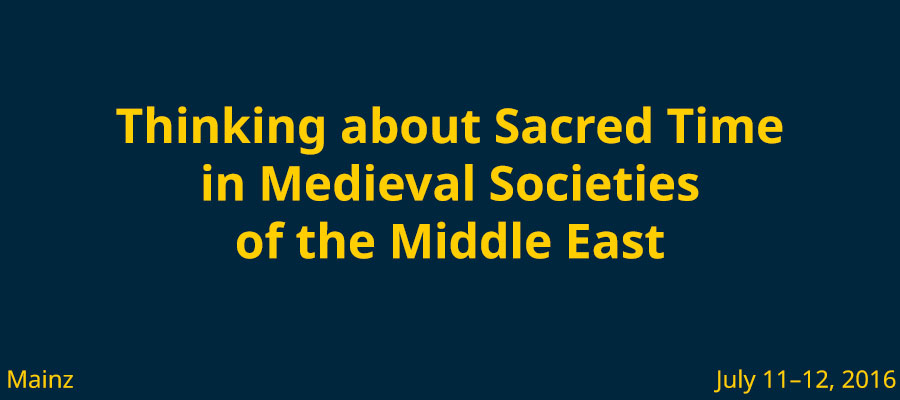Thinking about Sacred Time in Medieval Societies of the Middle East, Johannes Gutenberg University of Mainz, July 11–12, 2016
Thinking about Sacred Time in Medieval Societies of the Middle East is a workshop organized by Johannes Pahlitzsch (Johannes Gutenberg Universität Mainz), Youval Rotman (Tel Aviv University), Daniella Talmon-Heller (Ben-Gurion University of the Negev).
The idea that time is not homogenous – that some moments, days, or months are more privileged than others – was articulated by medieval thinkers of all denominations. The sanctification of such times by special practices seems to have been a universal cultural phenomenon. Yet, the construction of time as sacred, the choice of the specific time units to be set apart and the means by which they were distinguished from profane time, are diverse and dynamic; tied to historical-cultural contexts.
Sacred times were acknowledged in religious calendars that regulate recurrent religious devotions, yet sporadic and singular extraordinary events and situations (such as astrological events and significant natural phenomena) were also marked as times of divine intervention, and so were certain moments in the life-cycle of the individual, or the history of the community. Moreover, manifestations of sacred time played an important role in the formation of communal identity and in community-life, as well as within inter-faith relationships. They create what can be termed ‘ritual coherence’ on the one hand, and produce inter-religious conflicts, due to clashing concepts of sacred time and different calendars, especially between groups who shared the same geographical space, on the other hand.
In the workshop we are suggesting, we wish to investigate thinking about sacred time in the medieval Middle East. We would like to explore the conceptualization of sacred time in theological, legal and devotional works, and debates pertaining to the sanctity of specific times. We hope to elaborate on the different meanings assigned to privileged time, and on the social functions of practices marking sacred time. By bringing together scholars specializing in Judaism, Eastern Christianity and Islam, we hope to address these issues from a wide variety of aspects, disciplines and approaches and enhance our understanding of the medieval Middle East.
Comparative studies are especially welcome. Participants who wish to open a discussion around a specific text are encouraged to do so.
Those who wish to participate should contact Johannes Pahlitzsch and Youval Rotman by January 31, 2016.
Travel costs and accommodation will be covered by the organizers (up to a certain sum).
